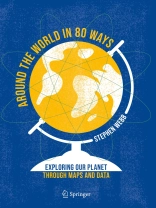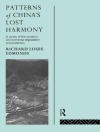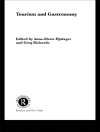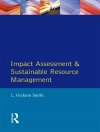Around the World in 80 Ways offers a (sometimes opinionated) discussion of 80 data-driven maps of our planet. Taken together, the maps tell a story about the physical world; about the impact our species is having on the world; and about how people live in the world – or at least how we lived immediately before the emergence of Covid-19. The maps lie.
All maps lie. But the origins of the deceptions are explained, the data sources are signposted and referenced, and the readers are shown how to create their own maps using freely available software. The reader is thus armed with the tools needed to explore local, national or world data – on topics ranging from science to society; environment to entertainment; wealth to wellbeing – a valuable skill in an age when certain politicians are happy to refer to “alternative facts” and media outlets deliver data visualizations that sometimes mislead as much as inform.
Spis treści
Mapping the World.- The World Itself.- The World of Countries.- The World Perturbed by People.- The World of the Built Environment.- The World of Thoughts, Ideas, and Beliefs.- The World of Wellbeing.- The World of Sport and Leisure.- The World of Economics.- Afterword.
O autorze
Following a first-class honours degree in Physics from the University of Bristol and a Ph D in Theoretical Physics from the University of Manchester
Stephen Webb has worked at a number of UK universities. In addition to shorter works, he has published nine books – one of which won the SETI League award and was shortlisted for the Aventis Prize (now Royal Society Winton Prize) for best science book. He is active in outreach activities, having spoken at numerous international conferences, podcasts and radio shows, and his 2018 TED Talk has been viewed over 6 million times. He has published an undergraduate textbook
Measuring the Universe – The Cosmological Distance Ladder (1999) as well as several popular science books, among them
Out of this World – Colliding Universes, Branes, Strings, and Other Wild Ideas of Modern Physics in 2004,
New Eyes on the Universe – Twelve Cosmic Mysteries and the Tools We Need to Solve Them in 2012, the second edition of
If the Universe Is Teeming with Aliens … WHERE IS EVERYBODY? Seventy-Five Solutions to the Fermi Paradox and the Problem of Extraterrestrial Life in 2015,
All the Wonder that Would Be – Exploring Past Notions of the Future in 2017, and
New Light Through Old Windows: Exploring Contemporary Science Through 12 Classic Science Fiction Tales in 2019 also published as part of Springer’s Science and Fiction series, as well as recently,
Clash of Symbols – A ride through the riches of glyphs.












